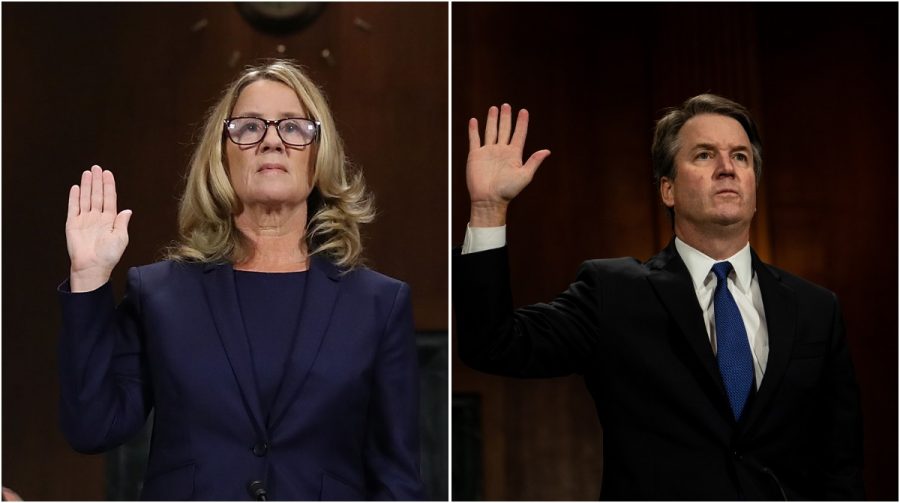The #MeToo movement has encouraged women nationwide to speak up about their sexual assault, but was recently put to the test in the infamous Brett Kavanaugh Case. Essentially, psychology Professor Christine Blaisey Ford accused Kavanaugh – newly nominated Supreme Court Justice at the time – of attempting to rape her at a high school party back in 1982. “Brett groped me and tried to take off my clothes,” said Ford during the hearing, “I believed he was going to rape me.” The timing of the accusation sparked both suspicion of Ford and support for Kavanaugh, leading to a hearing that would question such accusations from women and girls across America.
Promptly following the allegation, Kavanaugh demanded that there be a hearing. Ten days later, he got one. He additionally noted that the delay harmed both his reputation and loved ones. “The day after the allegation appeared, I told this committee that I wanted a hearing as soon as possible to clear my name,” testified Kavanaugh in his opening statement, “in those ten long days, as was predictable, and as I predicted, my family and my name have been totally and permanently destroyed by vicious and false additional accusations.”
The case held substantial weight on a government level, due that Supreme Court Justices legally have as much power as the president (in accordance with checks and balances.) Were the new nominee convicted, it would be a big win for the #MeToo movement, showing that not even someone with such power could get away with sexual assault. However, in her testimony, Ford herself claimed she came forward simply to inform the Court about Kavanaugh, not to keep him from obtaining a position there. “It is not my responsibility to determine whether or not Mr. Kavanaugh deserves to sit on the Supreme Court. My responsibility is to tell you the truth,” said Ford.
Regardless, neither Ford nor Kavanaugh could provide any concrete evidence, other than testimonies. Nothing solid was found that proved or disproved her allegations. In fact, not much could be investigated as the incident had occurred 36 years prior, at a party where witnesses were under the influence of alcohol. Because of this, along with the bias of testimony, an argument couldn’t be made from either group.
More significantly, their testimonies directly contradicted each other. Ford, when asked how sure she was that Kavanaugh was the perpetrator, replied “one hundred percent.” On the other hand, in Kavanaugh’s testimony, he firmly stated, “I am innocent.” As a result, this matter developed into a conflict of who needed to provide evidence: accuser or accused. At center and nationwide stage stood the question of if supposed sexual assault survivors should have to prove themselves. This was the notion directly challenging the ideas of the #MeToo movement, which advocates that women’s allegations be heard. Lake Ridge sophomore, and self-proclaimed feminist and advocate of #MeToo, Devin Castro disagrees with the idea, worried that doing so silences women. “We shouldn’t discredit her (Christine Ford’s) accusation until it is proven false,” declared Castro, “a lot of women are discredited. There’s a fear of speaking up.”
The presumption of innocence (until proven guilty) in contrast, is a foundation of the U.S. Criminal Justice system, being the 14th amendment of the Constitution. Thusly, Kavanaugh’s being urged to prove his innocence alongside Ford’s lack of evidence is a direct contradiction of it. Consequently, this aroused suspicion as well as support for the nominee. Gabriel Mendoza, junior, distrusts her allegations likewise. “It’s a bold statement for a lack of evidence,” said Mendoza, “and I think she’s just doing it for political reasons.”
The evidence that did exist was in the form of witness testimonies and a polygraph test (though they are not legally regarded as proof) . Once more, the witnesses were under the influence of alcohol, and their memory had to go back 35 years to a single party. Most witnesses were unsure of what happened that night, so it was ruled that no solid conclusions could be drawn from this. Additionally, Ford passed a polygraph test about her allegations, though one could speculate her success was due to her psychology expertise (given she is a professor in that area.) And strangely enough, Kavanaugh, though he supported polygraph use in the past, elected against taking it.
The Kavanaugh case eventually came to a close when it was concluded that prosecutor Ford could provide no evidence, due that legally a case cannot be made without it. While Ford didn’t win the case, thus leading some to feel the #MeToo movement lost as well, the way it blew up in the media has made more people aware of sexual violence, whether one believes survivors or not. Katrina Covington, chemistry teacher, is glad that the problem has gotten acknowledgement on such a large scale. “It’s good to see that people are bringing awareness to a big issue,” said Covington, “though some people just want attention.” Moreover, the result of the case serves as a reminder to Americans that, victim or not, the country’s judicial system stays consistent in that prosecutors will always need evidence.
Zoey Minor
ENN Special Contributor

